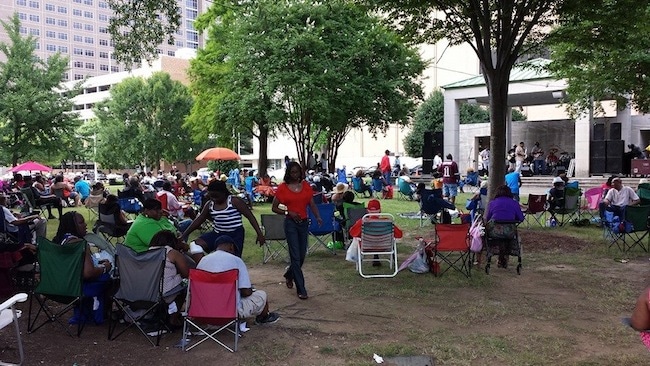Juneteenth marks the official end of slavery in the United States. On June 19, 1865, the last slaves in Texas were finally told they were free – a full two and half years after Abraham Lincoln issued the Emancipation Proclamation.
Though Juneteenth is widely celebrated across the U.S., some local educators fear that students, and even older adults, are still unaware of Juneteenth’s history and cultural importance. For WBHM, intern Morgan Smith has more.
It’s a hot Saturday afternoon in Kelly Ingram Park in Birmingham. Children are playing. Adults are chatting as music blares in the background. All of these things make up the 2014 Juneteenth Culture Fest. But this is not your ordinary day in the park.
Every year, in June, The Birmingham Civil Rights Institute puts on this free event for the community. According to Ahmad Ward, Head of Education and Exhibitions for the Birmingham Civil Rights Institute, the event has not always been as prominent as it is today.
“The first Juneteenth was held on the back patio of our facility. And I think they had like 300 people. And it got bigger and we started moving it outside,” says Ward.
“And now we have roadblocks and police protection and we got to get all of these permits because we’ve got all of Kelly Ingram Park blocked down. So, it has grown a lot over these 19 years.”
This year, about 2500 people came to the Birmingham Civil Rights Institute’s festivities. And while the festival has grown, Ward says people’s awareness of the day’s history hasn’t.
Barry McNealy is a U.S. History teacher at the historical A.H. Parker High School. He’s disappointed that Juneteenth is, as he describes it, one of America’s most unknown holidays.
“Juneteenth is important because the idea emancipation to African Americans after the Civil War wasn’t just a signing of the Emancipation Proclamation or ratification of the 13th Amendment,” says McNealy. “When these things had been done, there were still those that refused to allow people held in bondage to be free and to go on with their lives.”
History aside, it’s also personally significant to him.
“To me, Juneteenth means that the dark night of slavery had come to an end and it opens us up to the future that’s possible for this whole country,” he says. “I think that it’s important for Americans to understand that the life that we enjoy today, the life that people live today, was not an overnight process.”
And raising awareness of Juneteenth hasn’t been an overnight process either.
Next year is the 150th anniversary of Juneteenth. Nationally, there have been several campaigns to raise awareness ahead of this anniversary. The campaign is lead by websites like Juneteenth.com, and Rev. Ronald V. Meyers, Sr., M.D., Founder of the National Juneteenth Observance petition.
So, after all these years, why is the history of Juneteenth still unknown to most people? Some might think it’s due to students not listening in class, but it’s actually not found in Alabama school curriculums.
“Juneteenth history is not mentioned in a lot of textbooks. Again, it might depend on where you are. But you’re not going to learn about Juneteenth at school, unfortunately,” says Ward.
Nettie Carson-Mullins is from the Alabama State Department of Education. She says that the State Department has no control over what exactly goes in to school textbooks.
“It’s according to the textbook that the school districts adopts. The state of Alabama, or the State Department of Education does not have control over what textbooks are adopted by the Local Education Agencies,” explains Carson-Mullins.
Mullins goes on the say that the textbooks that come through the State Department are looked through, but not for holidays or different celebrations, specifically.
“It might be a sentence or two in some textbooks,” says Carson-Mullins.
She does, however, personally think more Alabama students should learn about Juneteenth in school.
“It’s a cultural holiday. And we celebrate all holidays.”
For those who do understand and celebrate Juneteenth, its significance is greatly appreciated. The day has taken on an even stronger meaning for Samuel Pugh of the Birmingham Civil Rights Institute.
“Historically, Juneteenth is freedom in and of itself. It’s the true ending of slavery. It’s an awakening,” says Pugh. “But as far as it today, it’s family. It’s friendship. It’s relationships. It’s the relationships that we have with the community.”

